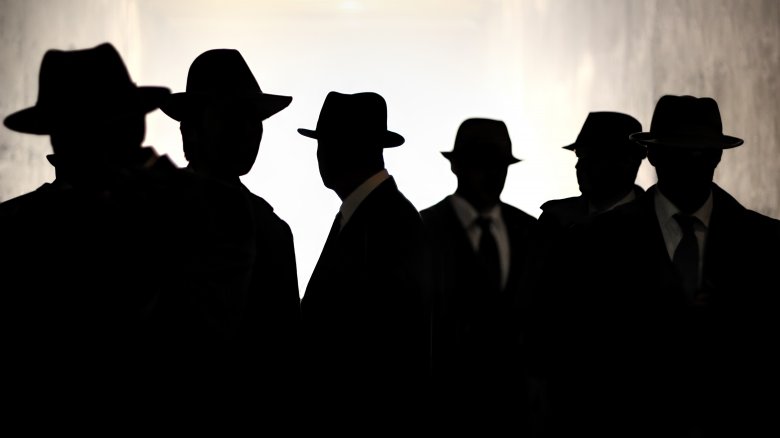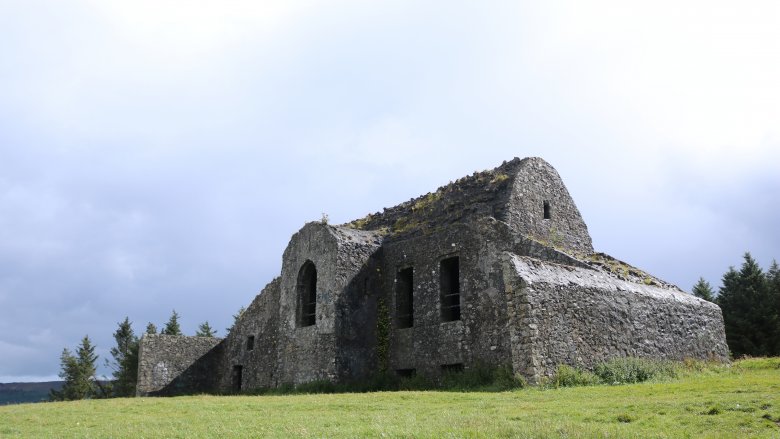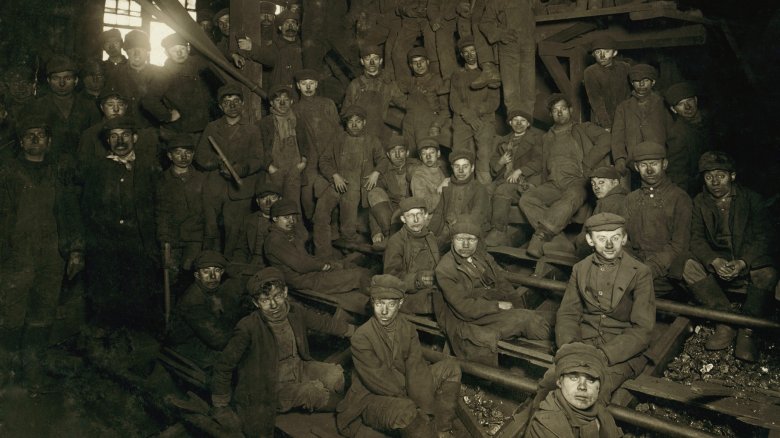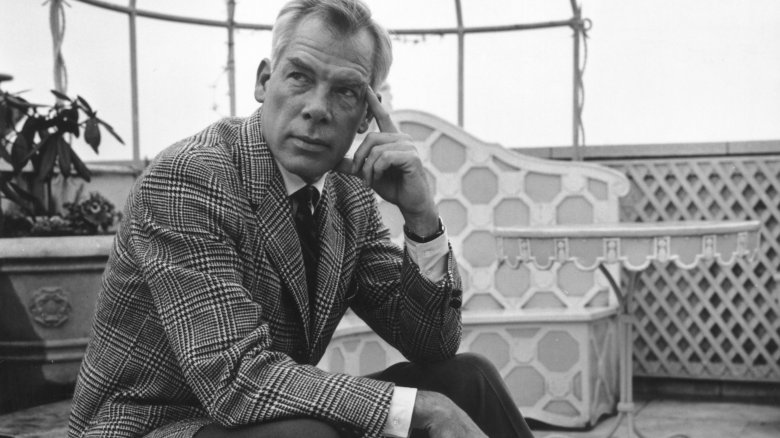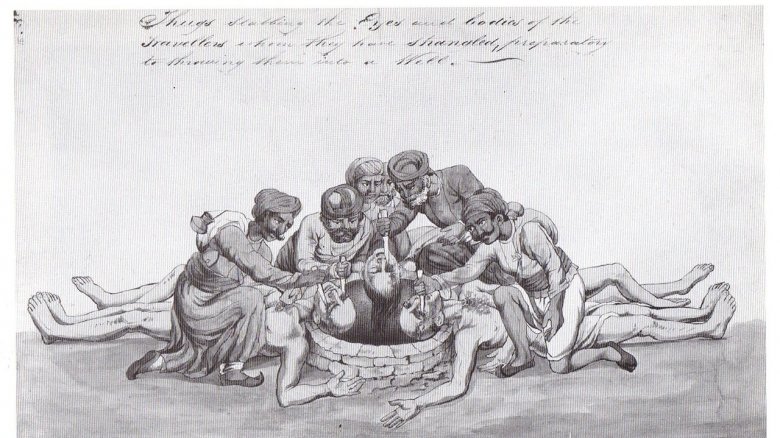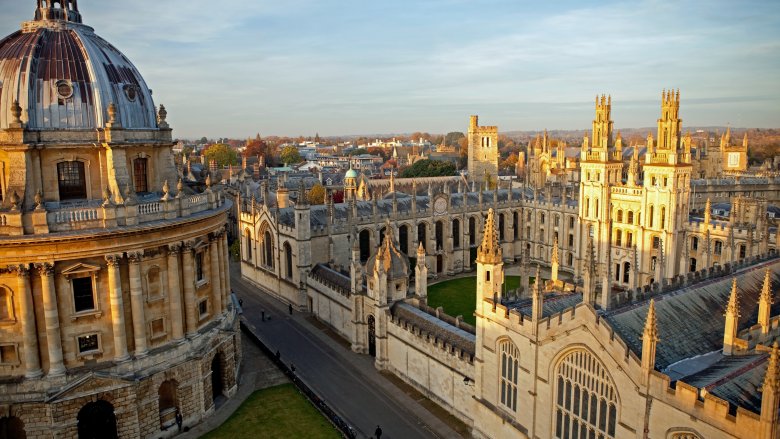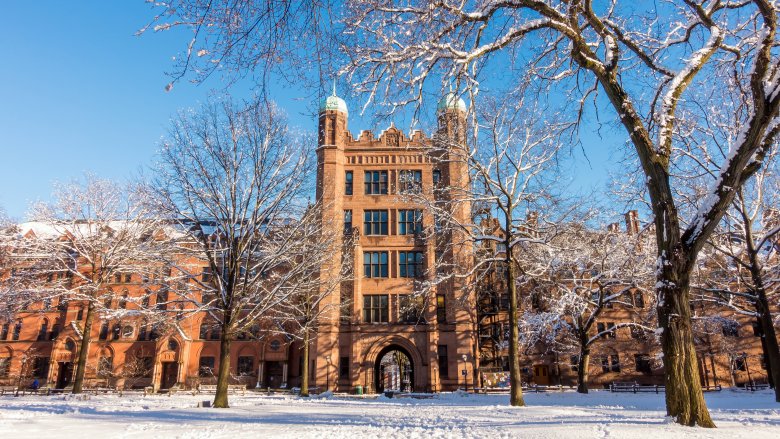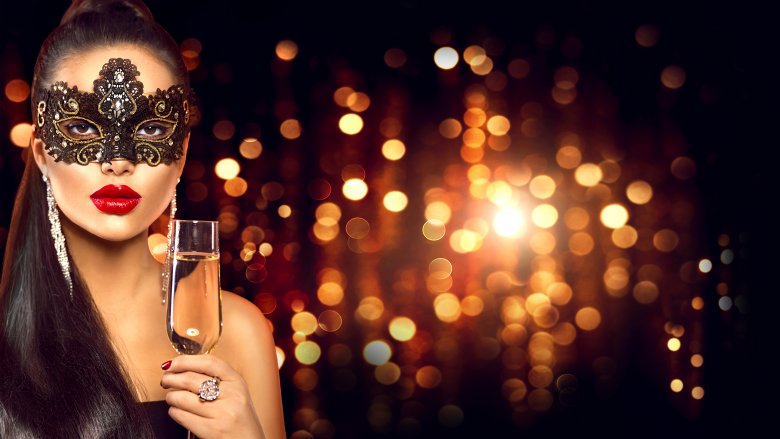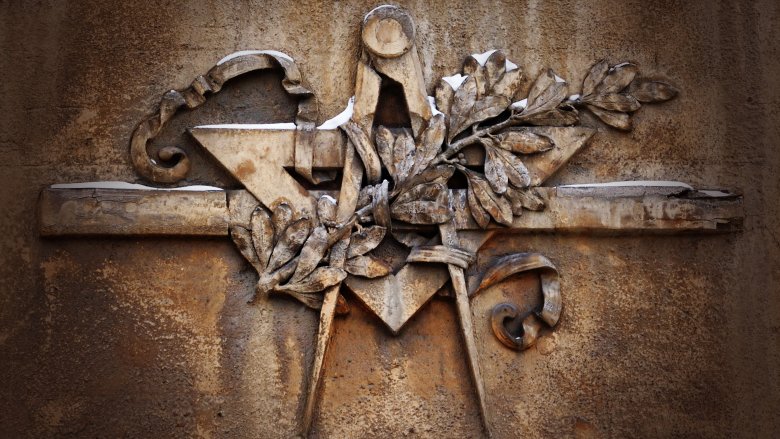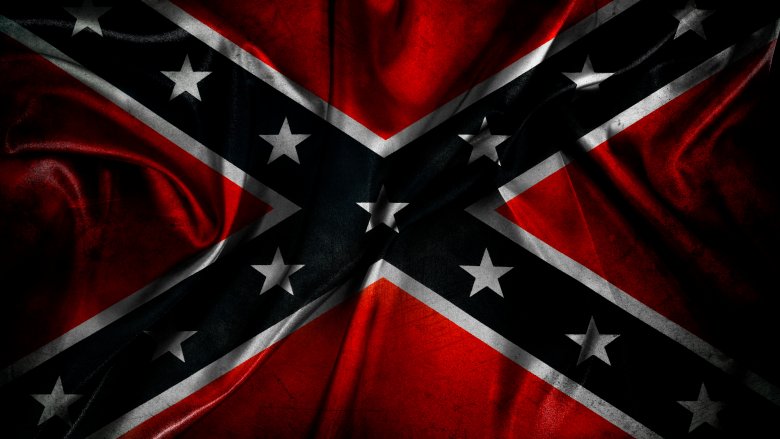Most Exclusive Secret Societies In History
There's something awesome about the idea of being in a secret society. It's a sense of belonging, community, sharing in something special, and being able to put a sign on the door that keeps out the grown-ups. Everyone would rather be on the "us" side rather than the "them" side, and some people took it to extremes.
The Great Enlightened Society of Oculists
In 2012, Wired reported on an academic treasure hunt that sent a linguistics expert, a computer translation programmer, and plenty of historians on a strange journey through a cryptic text. After a heck of a lot of work, they began to translate a document that had remained a mystery for over two centuries. They were shocked when they found it contained the secrets of an 18th-century society called the Great Enlightened Society of Oculists.
We knew the group was made of eye surgeons who fancied themselves healers and keepers of all the medical knowledge about the eye and sight. We knew they did things like perform cataract surgeries. But we had no idea what went on behind the scenes. The decoded manuscript included details like an initiation, where a new member was taught to "see" after having eyebrow hairs plucked out. When more documents were translated, they found the Oculists may have had another mission — to keep an eye on the Freemasons.
Oculist documents included top secret rituals of Freemasonry, up to the highest degrees. That's all pretty common knowledge now, but it wasn't at the time, and it was clear they'd done some serious espionage. They may have been spies, or perhaps a splinter group of Freemasonry created to keep their core rituals safe if the Catholic Church decided to get as stabby with them as they had with the Templars. No one really knows.
The Order of Chaeronea
On May 25, 1895, Oscar Wilde was escorted to a London jail after his conviction for sodomy. There were a lot of messed up things happening in the Victorian era, but the popular stance on homosexuality wasn't just messed up, it was downright dangerous. Hence, the secrecy. Wilde had met writer and poet George Cecil Ives a few years before, but it wasn't until 1897 Ives was inspired to found the Order of Chaeronea. Ives was vocal about ending the hate and oppression of the gay community, but at the same time the society was a closely guarded secret.
According to the Harvey Ransom Center at the University of Texas at Austin (which is home to many of his papers), the society was named after the ancient battle of Chaeronea. It happened in 338 B.C., and it was notable for the wholesale slaughter of the Sacred Band of Thebes, a group of warriors made strictly of couples who were close friends or lovers. Ives' society was protected by layers of passwords, codes, seals, and rituals but still grew to include chapters all over the world.
The society started with a group of Oxford writers, and while we don't know much of what went on, we do know (via Killing The Rainbow: Violence Against LGBT) they were responsible for translating a lot of the ancient Greek works, raising the profile of homoeroticism in the ancient world, and starting of gay rights' movements.
The Hellfire Club
There are a few locations still associated with the Hellfire Club, like West Wycombe Park, the George and Vulture pub in London, and Mountpelier Hill outside Dublin. We know they were the meeting places of a group called the Hellfire Club, but thanks to notoriously tight-lipped members, there's as much folklore about the group as there is actual history.
English clubs were restrained but elite, and chapters were founded by Philip Wharton (later made a duke), and Francis Dashwood. According to The Daily Beast, their craziness involved a lot of drinking (mostly claret and port) and drugs (mostly laudanum and opium). There was plenty of sleeping around, card-playing, and backgammon, but if you wanted serious hellfire, you needed to go to Ireland.
Most of the rumors are pretty dark, and they were accused of practicing Satanism, holding demonic orgies, and according to the Irish Times, they were even said to invite the devil himself to their regular card games. Founded in the mid-18th century, the chapter met mostly at Cork Hill's Eagle tavern, and the aristocratic members got up to the usual shenanigans like getting too friendly with daughters. Some antics were less friendly. One club member, Henry, the fourth Baron of Barry of Santry, forced a bedridden servant to down a bottle of brandy then set him on fire. He was burned alive, and Henry bought the silence of those who knew. The rich have always had different ways to solve problems.
The Molly Maguires
It's not clear why the group called themselves the Molly Maguires, but Lehigh University suggests the name might refer to a real Irish woman who rebelled against her Protestant English overlords by refusing to be kicked out of her cottage. These Mollies were a society of Irish immigrants who settled in the Pennsylvania area and took a stand against unfair labor practices and discrimination in the most extreme way possible.
At a time when "No Irish Need Apply" signs were the norm, immigrants found work wherever they could, often in the coal mines. The Irish Story says they faced all kinds of injustices, like long hours and bad pay that was lowered as much as 20 percent with the renewing of contracts. When unions didn't work, the Mollies assembled.
They were extremely well-organized, broken up into small groups that ran in different areas. Groups would meet to discuss who they needed to strong-arm, what mines needed disruption, and who needed a beating or a killing. If complaints were worthy of action, an outside cell would be contacted to county-hop, carry out the hit, and go home. It was a brilliant way to keep local members from being identified, and favors would be returned. The Mollies were ultimately infiltrated by the Pinkertons, who sent in an Irishman named James McParlan. It took him almost four years of undercover work to break the Mollies open, and his information ended 20 years of terror with a 20-man hanging.
The Sons of Lee Marvin
Director Jim Jarmusch told Uncut that the super-exclusive Sons of Lee Marvin group really does exist, but beyond that, he's not saying much. Neither are the members, reported to include Iggy Pop and Tom Waits.
So, what's the deal? Jarmusch says he had the idea for a movie about a reclusive, alcoholic, cranky guy living in middle of nowhere. The character would be played by Lee Marvin, and the story would focus on how his sons dealt with him. The movie never happened, but he says the organization definitely did. Dangerous Minds reports the society is open to men who look like they could pass for Lee Marvin's son, but guess who's not a member?
Jarmusch says Tom Waits was in a California bar when he was told someone wanted to speak with him. He went over, and the guy asked about the Sons of Lee Marvin. "Tom said, 'What's it to you?" The response? "Well, I'm Lee Marvin's son." He should probably get a membership card.
The Horseman's Word
In rural Scotland, those who had a natural skill with horses were held in such high regard they were almost magical, and the Horseman's Word was a secret society open to only the best of the best. It was formed some time in the mid-17th century, and according to writer and historian Ashley Cowie, members were reportedly the keepers of a sacred word, given to them by the Devil, that gave them power over horses and women, because of course it did.
There was a practical side to the group, as they acted both as a trade union and a repository of knowledge that would help ensure those who worked with the world's valuable horses actually knew what they were doing. Part of their very real success was possibly the preparation of lotions, salves, and scents that would make horses — and perhaps women — more docile and willing.
Punishment for revealing secrets was in the oath, and involved being drawn and quartered while having your heart ripped out by two horses, which is some serious incentive to keep quiet. We do know members participated in a series of rituals similar to those in Freemasonry, with ale-drinking, shaking hands with the "devil," and knowledge of the secret words. They're not so secret anymore, though: "Both As One." They also promised to treat all horses kindly, which we can all get behind.
The Thuggee
If you call someone a thug today, just know they aren't nearly as cool as the original thugs. According to NPR, the thuggee were a society of professional criminals, and membership was handed down from father to son. They're so mysterious no one is even sure how organized they were, what kind of society they formed, or how far they reached. The first mention of the thuggee was from a history text written around 1356, but it wasn't until the 1830s that India's British governor-general, Lord William Bentinck, set out on a crusade to destroy the cult. He and his sidekick, Captain William Sleeman, convicted around 2,000 thuggee, sentencing them to either death or transportation.
The story goes that thuggee scouts would join up with a group of travelers, make friends, scout the situation, then give the signal: "Bring the tobacco." Thuggee would strangle the victim, relieve them of worldly possessions, mutilate identifying features, and bury them face-down in a grave. It's no wonder Sleeman wrote "India was under attack" (via Reflections of India), but no one's quite sure who these attackers were. A fanciful history of the thuggee claimed they were created from the sweat of the goddess Kali herself, and that she established the cult, ordered them to strangle and eat the victims, and ultimately rethought the last bit in favor of a burial with a sacred pickax. How much was racial hatred and how much was truth, we have no idea.
Bullingdon Club
Oxford University's Bullingdon Club is restricted to 12 members, and with a former membership list that includes the likes of David Cameron and Boris Johnson, you can guess what kind of club this was. Thanks to 21st-century reporting on some of the less-than-honorable rites and rituals of the society, The Telegraph said it was down to only two members in 2016 and that no one else wanted to join.
That includes friends of people who were in the club, and it's largely due to popular opinion about the club's goals, which is apparently to flaunt your wealth in the most obnoxious ways possible. In 2004, rituals like trashing pubs and burning £50 notes in front of the homeless were outed, and anyone who wants to join in that sort of fun is sporting a seriously defective sort of morality. Oxford students tossed around words like "elitist," "exclusionary," "scandal," and even "joke," with an expose from The Guardian reporting some members spent as much as £10,000 a year paying for champagne and damages. Break stuff and pay for it? Sounds ... not fun at all, actually.
Eliezer
You've heard of Skull and Bones, the super-elite, super-wealthy, and traditionally super-white secret society of Yale University, the one that The Atlantic says launched the political careers of presidents like William Taft and the Bushes. Less well-known is Eliezer, founded in 1996 as a sort of anti-Skull and Bones. It's well-known on campus, but the inner workings remain secret. However, it's a secret society that's potentially open to all the people who would have been laughed out of the room by Skull and Bones, including Jews, women, and minorities.
According to Time, only about 10 students are tapped on the shoulder and invited to join each year, and unlike some secret societies who are concerned with drinking and damage-doing, Eliezer meetings attract speakers that include actors and comedians as well as activists, senators, and world leaders. Those same world leaders go out of their way to attend the annual Shabbat dinner, and they may be spreading to other universities, which is probably a lot better than if Skull and Bones was spreading.
Snctm
Absolutely everything about Snctm is completely NSFW, but we'll do our best.
If you've ever seen Eyes Wide Shut, it's basically that. There's not a coincidence, and founder Damon Lawner said as much to Esquire in a 2016 interview. After a lifetime of going between a hippie community, a commune in Upstate New York, and a life of luxury, Lawner decided to follow the path his midlife crisis was heading down and establish an ultra-private sex club. Women can buy a ticket (as long as they can pass Lawner's screening process), men need to be members, and anything goes. Monthly masquerades include things like men in bunny masks, plenty of topless women, and random, spontaneous orgies. Members pay $10,000 annually, or can pony up $75,000 for a Dominus lifetime membership, gaining entrance into mansions filled with the sorts of things that occupy the daydreams of a very lonely 15-year-old boy.
Perhaps unsurprisingly, Lawner also spoke with Goop and went into a little more detail on what sort of things they look for in potential female members, like Devotees, who wear very little and are occasionally led around on chains. There are rules, like "no photography" and "everything must be consensual." If you're wondering how anything is enforced, Lawner says he has "information on everyone in the mansion. This is a group that has too much to lose personally and professionally to not play by the rules." Play nice, rich people.
Propaganda Due
If you happen to know any Freemasons, they probably insist they're not out to rule the world. They can say that all they want, but there was at least one Masonic lodge that had designs on doing exactly that.
Licio Gelli died in 2015, and his obituary in The Independent reads like a thriller you'd pick up at the airport. When he sat at the head of P2 — short for Propaganda Due — he was called Il Maestro, and he guided the super right-wing activities of the rogue lodge as they organized their efforts to overthrow and oust any leftist influences in the country with the goal of creating a new Italy. His manifesto was called the "Plan for Democratic Rebirth", and it involved everyone from the Italian military through to journalists, businessmen, and bankers.
P2 was active throughout the 1970s and '80s, not exposed until 1981. Investigators looking into something completely different came across a membership list, and the fallout was so massive it included a government and financial collapse, plus some death. Gelli was tried on various charges, including fraud, but didn't serve much in the way of jail time. Politico says that was in part because by the time he was linked to a 1970 plot to cause a military coup, the statute of limitations had run out. Yes, Virginia, conspiracy theories are real.
Knights of the Golden Circle
If members had their way, the Golden Circle would have been a very real thing. It would have referred to the areas of the southern U.S., part of Mexico, the West Indies, and part of Central America. The knights' goal was to turn this circle into a golden, slave-holding paradise that would have secured a monopoly on the world's tobacco and sugar supply.
Of course, when we call it a paradise, that's referring to a paradise for the knights, who would have been a group of around 16,000 who joined the organization founded by George Bickley in 1854, all with the shared goal of thumbing their nose at the north and preserving the southern way of life. It wasn't until around 1860 the whole thing took off, and around 32 "castles" were established all across the south. They even started to stage an invasion of Mexico, but Bickley didn't show and everyone just sort of went home.
They had everything a good secret society should, like codes, rituals, and members divided into three divisions: political, financial, and military. Many served in the Confederate Army during the Civil War, and according to the Texas State Historical Association, the end of the war ended the KGC, too. There are plenty of rumors it persisted beyond that, but nothing reliable. Any post-war members probably died while waiting for the rest of their Mexican invasion force to show up.
